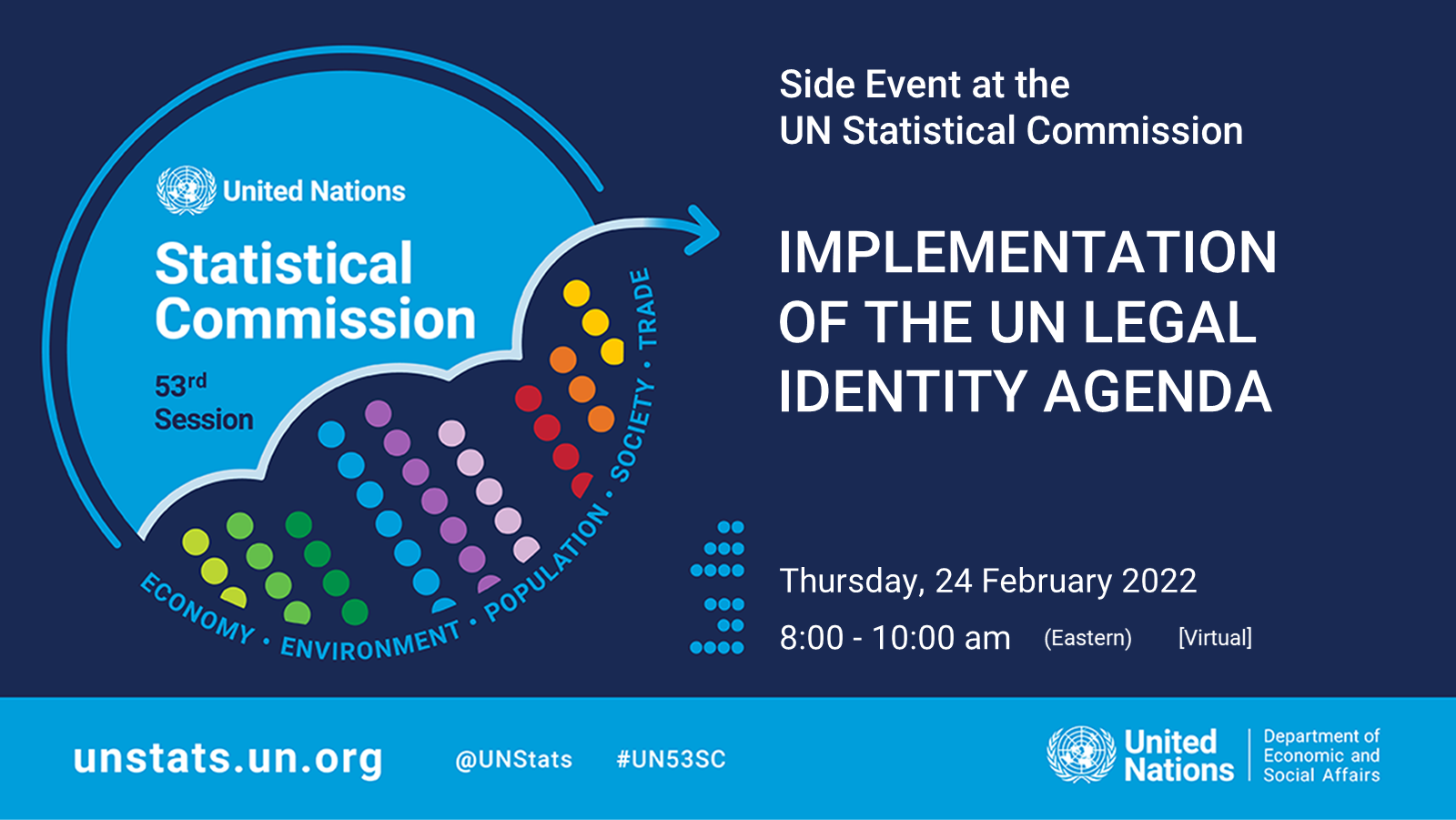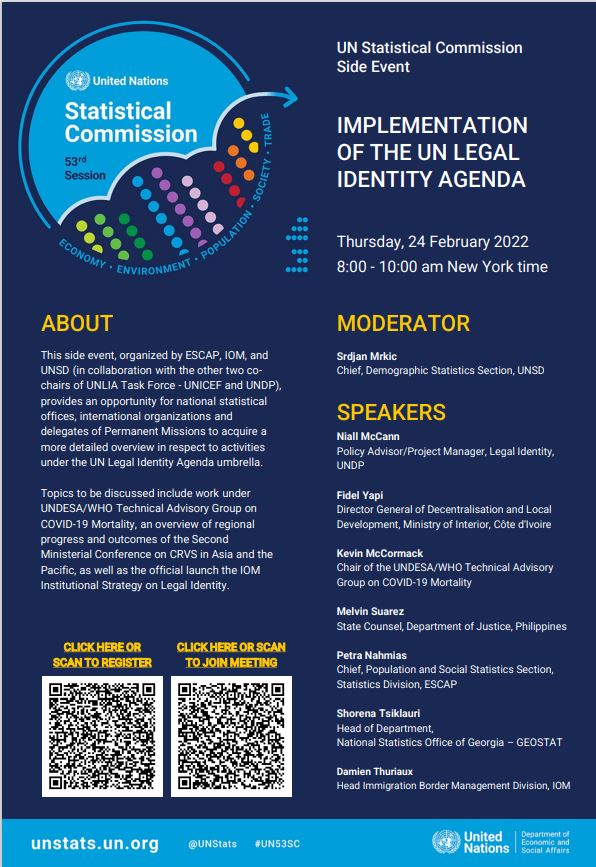United Nations Statistical Commission
Overview 53rd Session (2022) Side Events

About
Everyone has the right to be recognized as a person before the law, as enshrined in Article 6 of the Universal Declaration on Human Rights and several international human rights instruments.1 To address this, the 2030 Agenda for Sustainable Development, agreed by all member states in September 2015, established a specific target within the Sustainable Development Goals (SDGs) - Target 16.9 – legal identity for all.
As civil registration provides an official record of the existence of the person and the recognition of that individual before the law, it has been the fundamental means of granting legal identity. Moreover, civil registration is recognized as the ultimate source for production of comprehensive, regular and reliable vital statistics. An inclusive civil registration and vital statistics (CRVS) system helps to ensure no one is left behind, protects human rights, empowers individuals, and promotes sustainable development. Although significant progress has been made across the world, universal registration of vital events is yet to be achieved and millions of people worldwide are born and die without any legal tender of their existence - the scandal of invisibility.
Recognizing the importance of achieving SDG's Target 16.9 – legal identity for all by 2030 - the United Nations Secretary-General's Executive Committee, in January 2018, mandated the Deputy Secretary-General to convene "UN entities to develop, in collaboration with the World Bank Group, a common approach to the broader issue of registration and legal identity...". To operationalize the decision of the Executive Committee, an inter-agency coordination mechanism – the UN Legal Identity Agenda Task Force (UNLIA TF) – was established, consisting of 13 UN agencies, co-chaired by UNDESA, UNDP and UNICEF, tasked to develop and implement the UN Legal Identity Agenda – a holistic approach to civil registration, vital statistics and identity management.
This side event, organized by ESCAP, IOM, and UNSD (in collaboration with the other two co-chairs of UNLIA TF - UNICEF and UNDP), provides an opportunity for national statistical offices, international organizations and delegates of Permanent Missions to acquire a more detailed overview in respect to activities under the UN Legal Identity Agenda umbrella, in addition to the documents provided to the 53rd Session of the UN Statistical Commission.
Most notably, the event will provide an overview of regional progress and outcomes of the Second Ministerial Conference on CRVS in Asia and the Pacific, held on 16-19 November 2021, when over 400 participants, including ministers, senior officials and stakeholders from 48 countries and 15 international and civil society organizations convened virtually to mark the midpoint of the Asia and Pacific CRVS Decade (2015-2024).
The side event aims to celebrate the progress made by member States at the midpoint of the Decade, as well as outline areas where accelerated efforts are needed to achieve the joint vision that by 2024, all people in Asia and the Pacific will benefit from universal and responsive CRVS systems, facilitating the realization of their rights and supporting good governance, health and development. The side event will feature examples of multisectoral collaboration to ensure civil registration of marginalized population groups, good practices in ensuring resilient CRVS systems during times of crisis such as COVID-19, as well as feature the voices of children and youth who advocate for strengthened and inclusive civil registration systems.
Secondly, the side event will represent an opportunity to provide a briefing on the forthcoming IOM Institutional Strategy on Legal Identity, presenting it to a broader stakeholder community. The Strategy is based on IOM's Strategic Vision 2019-2023, anchored in IOM's legal framework, and complements ongoing collaborative efforts within the UN system to address the global legal identity gap, with a specific focus on human mobility. For the past two years, the development of the Strategy has undergone an extensive internal and external consultative process including Member States consultations and roadshows, masterclasses and pilot programs.
With the launch of the Strategy, IOM commits itself to increasing its focus on legal identity as a critical enabler of global mobility and the realisation of migrant's rights, whereas a broader UN community working on addressing global legal identity gap gets an opportunity to learn more about migration aspect of this problem. Looking ahead to the next decade, the strategy's implementation will focus on priority actions cutting across research, policy, legal and technical capacity building, as well as communication and advocacy, and present the opportunity to address the legal identity commitments under both the 2030 Agenda and the Global Compact for Safe, Orderly and Regular Migration (GCM), fostering sustainable development, as well as safe and regular migration.
Moderator:
-
Srdjan Mrkic
Chief, Demographic Statistics Section, UNSD
Speakers:
-
Niall McCann
Policy Advisor/Project Manager, Legal Identity, UNDP
Fidel Yapi
Director-General of Administration and Local Development, Côte d'Ivoire
Janet Mucheru
Registrar General, Secretary of the Department of Civil Registration Services, Kenya
Kevin McCormack
Chair of the UNDESA/WHO Technical Advisory Group on COVID-19 Mortality
Petra Nahmias
Chief, Population and Social Statistics Section, Statistics Division, ESCAP
Melvin Suarez
State Counsel, Department of Justice, Philippines
Shorena Tsiklauri
Head of Department, National Statistics Office of Georgia - GEOSTAT
Damien Thuriaux
Head, Immigration Border Management Division, IOM
1 Such as 1948 Universal Declaration of Human Rights, Articles 6 and 15; 1951 Convention on the Status of Refugees, Articles 25 and 27; 1954 Convention on the Status of Stateless Persons, Articles 25 and 27; 1961 Convention on the Reduction of Statelessness, Articles 1-4; 1965; 1969 International Convention on the Elimination of All Forms of Racial Discrimination, Article 5(d)(iii); 1966 International Covenant on Civil and Political Rights, Article 24; 1979 Convention on the Elimination of All Forms of Discrimination Against Women, Article; 1989 Convention on the Rights of the Child, Articles 7-8; 1990 International Convention on the Protection of the Rights of all Migrant Workers and Members of their Families, Article 29; 2006 Convention on the Rights of Persons with Disabilities, Article 18.
